😄 If you’re already familiar with the concept of internal tools, jump straight to > Best Open Source Projects for Building Internal Tools
What are the benefits of internal tools?
Internal tools play a key role in improving company processes and boosting efficiency.
- Increase efficiency and cut costs: Internal tools simplify processes, reduce the need for manual work, and minimize errors.
- Enhance decision-making and insights: Internal tools help businesses gather and analyze data more effectively, providing real-time insights for better decisions.
- Boost employee productivity: By cutting down time spent on manual tasks, staff can focus on more valuable work.
- Improve customer satisfaction: Faster and more accurate processes lead to happier customers.
Investing in the right internal tools can greatly improve efficiency, lower costs, and boost overall business performance.
💡 Read More: Top 11 Open Source Internal Tools with the Most GitHub Stars
What are internal tools?
Today’s businesses use internal tools to boost efficiency. These tools help with many tasks like managing data, projects, and customer relationships (CRM). Here are some common types of internal tools:
- PM: Asana, Trello, and JIRA help teams plan, carry out, and track projects.
- CRM: Salesforce and HubSpot manage customer interactions and improve sales and marketing.
- DMS/CMS: Confluence and SharePoint offer a central place to store, share, and edit files and other content.
- HRMS: Workday and BambooHR manage employee info, hiring, performance reviews, and pay.
- ERP: QuickBooks and Xero help businesses manage accounts and financial reports.
- BI: Tableau and Power BI are used for showing data visually and supporting decisions.
💡 Read More: Build CRM in Hours: Top No-Code/Low-Code Tools You Need to Know
Best Open Source Projects for Building Internal Tools
There are many internal tools on the market, with lots of them being cloud products. While cloud products are easy to use, they bring two issues:
- High costs as users increase;
- Lack of data control.
So, today we’ll look at the best open source projects on GitHub for building internal tools. The open source versions are free and can meet most needs of small to medium startups, schools, or nonprofits. Also, self-hosting internal tools gives companies full control over their data.
This list will only share internal tool projects on GitHub with over 10,000 stars.
I hope this list helps you build internal tools better, faster, and cheaper!
Tool 1: NocoBase
Info
No-code / Low-code
GitHub Project Start Date: 2021
Related Resources:Website | GitHub | Docs
⭐️ Stars: 11.2K
NocoBase is an open-source no-code/low-code platform made for building internal tools, business apps, and company solutions. NocoBase helps businesses quickly set up custom business apps like CRM, PM tools, and other business process management solutions without spending a lot of time and money on software development.
Here’s a real-world example: Let’s say your company needs to quickly build a custom inventory management system to track stock in different warehouses.
In NocoBase, you’d first set up the needed database, tables, and fields, defining key details for inventory items like product name, quantity, and warehouse location. Next, using its WYSIWYG UI design interface, you’d build an easy-to-use interface linked to your data model by dragging and dropping blocks like tables, charts, and forms. Lastly, you’d set up automated processes, like sending a restock request when inventory gets low. These processes are made using NocoBase’s workflow feature, making sure business processes are automated and need less manual work.
NocoBase Setup Page:
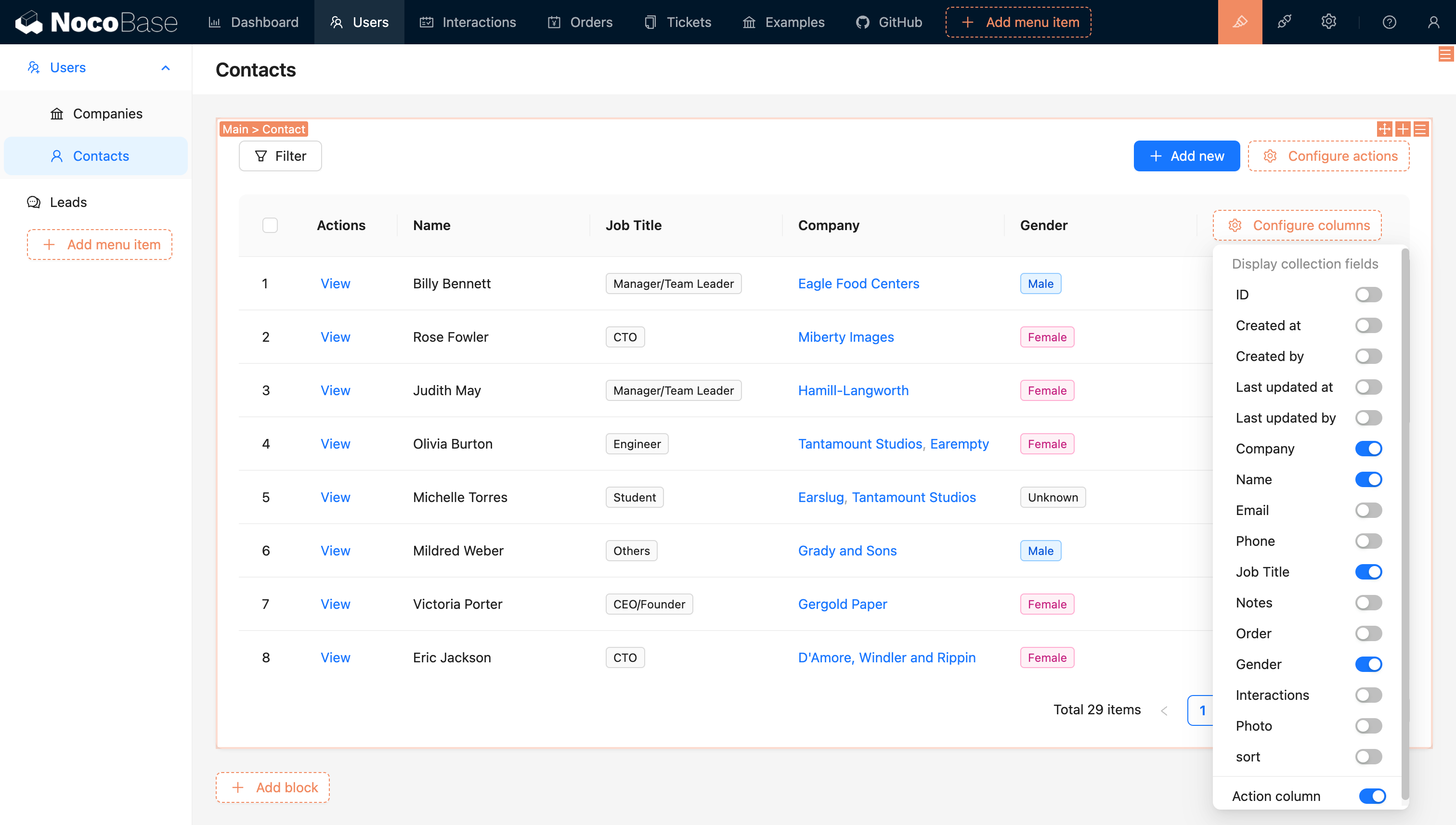
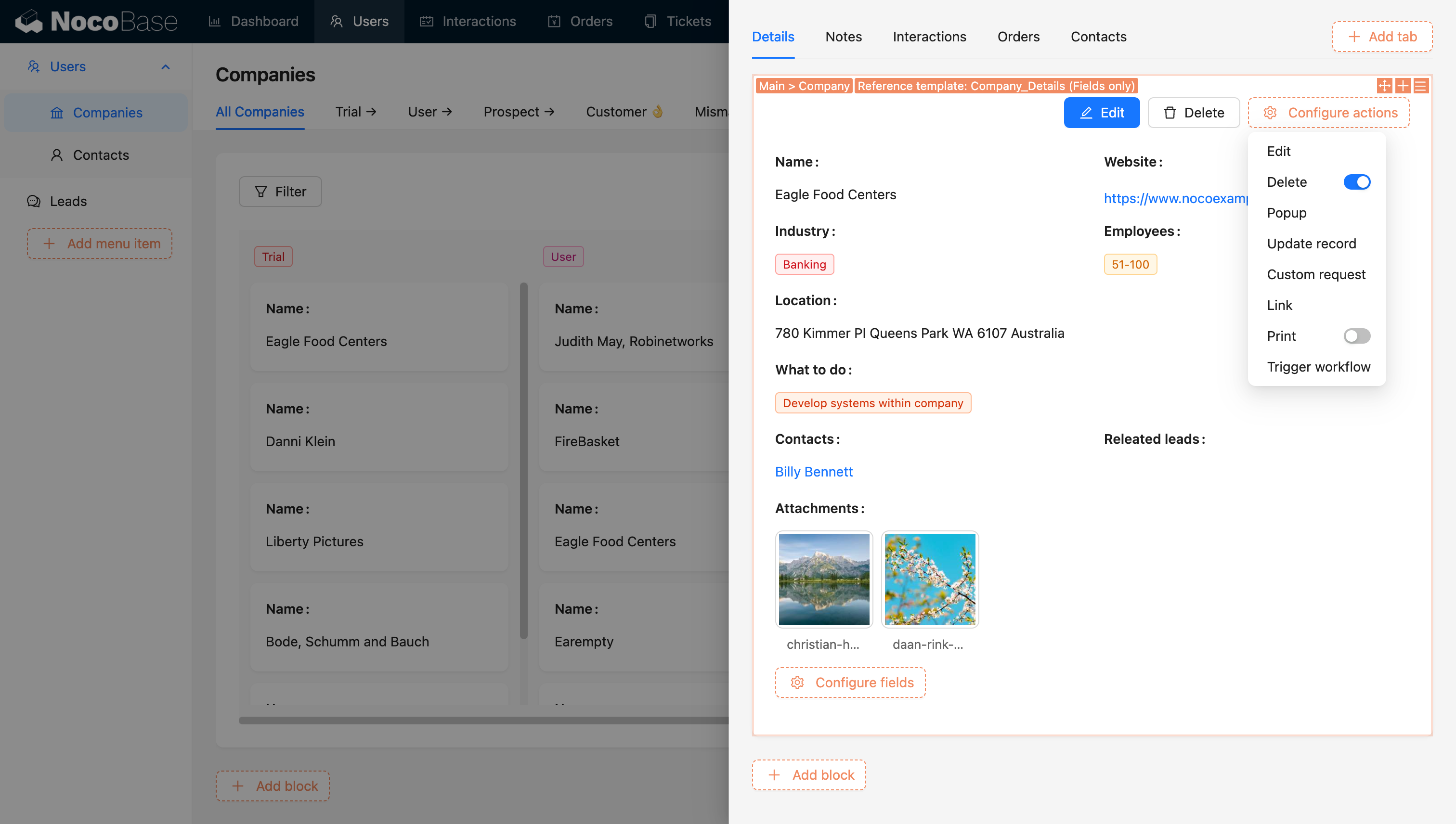
NocoBase Data Source Connection:
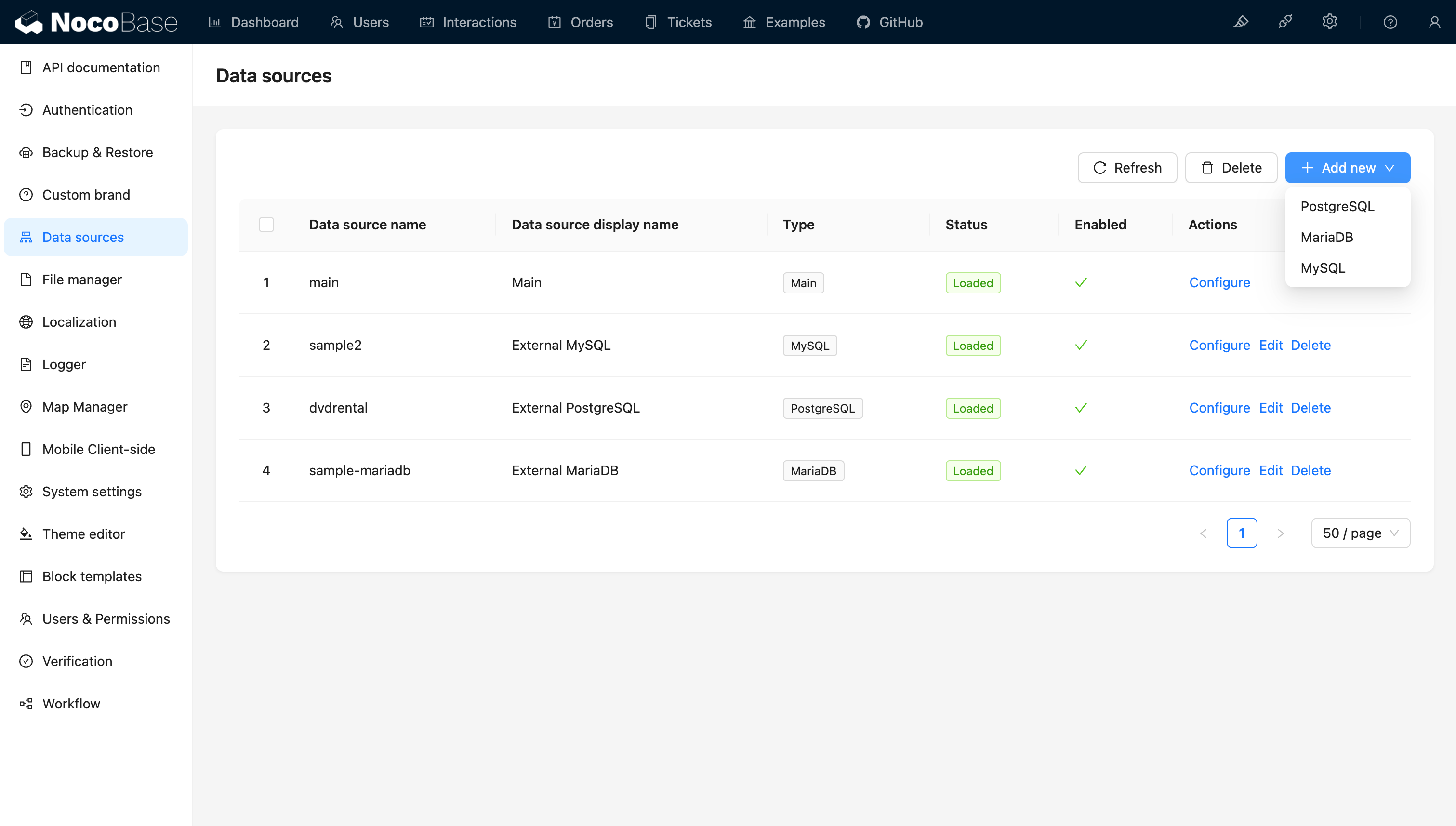
Customer Lifecycle Management:
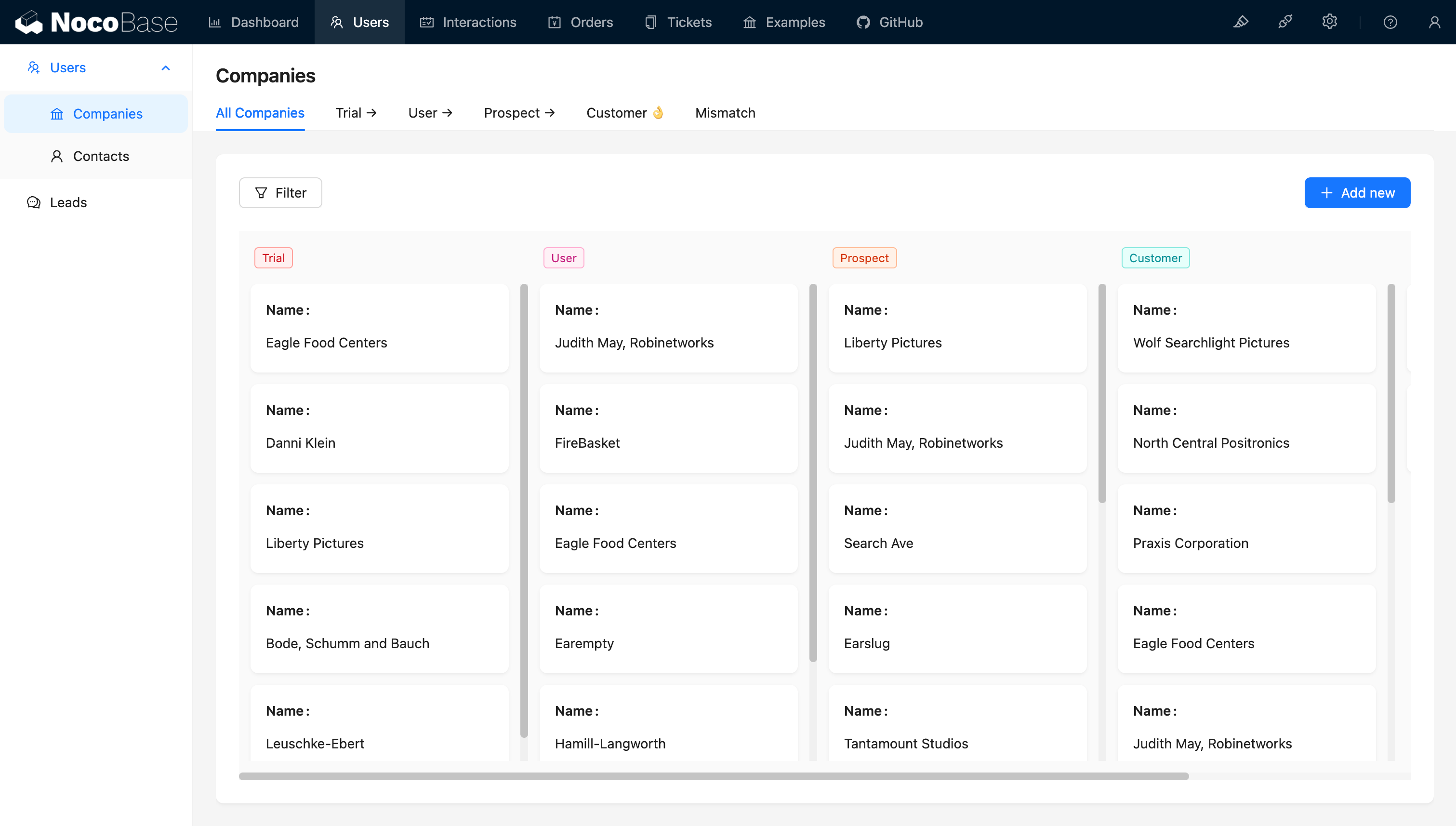
Strengths
- Data model driven: Unlike many no-code products that create data structures directly in the user interface, NocoBase allows complex data structure design deep in the system backend, outside the UI. This increases the flexibility and scalability of applications. This approach is better for systems that need to handle complex business logic.
- Plugin-based structure: Uses a microkernel and plugin design. All features are provided through plugins, so users can customize and expand system functions as needed.
- Workflow automation: Has a built-in workflow control system. This achieves efficient business operations and management by automating data flows and business process organization.
- Enterprise-level security: Offers advanced user authentication and permission management features. This ensures data and application safety, suitable for business environments that need strict data protection.
Suitable for
| Internal Tool Type | Is it Suitable? |
|---|---|
| PM | ✅ |
| CRM | ✅ |
| DSM/CSM | ✅ |
| HRMS | ✅ |
| ERP | ✅ |
| BI | ✅ |
How to Get Started
NocoBase offers three installation methods: Docker (recommended)、create-nocobase-app、Git source code.
Pricing
NocoBase Community Edition is free and meets most small business and team needs.For higher demands in security, tech structure, and support, choose a paid version:
- Community Edition: Free
- Basic Edition: $800 one-time fee
- Professional Edition: $8,000 one-time fee
- Enterprise Edition: $16,000 one-time fee
All paid versions offer lifetime licenses.
🙌 Have a try: NocoBase Tutorial – Task Management System
Tool 2: Budibase
Info
Low-code
GitHub Project Start Date: 2019
Related Resources: Website | GitHub | Docs
⭐️ Stars: 21.4K
Budibase is a powerful no-code platform designed for quickly building and managing internal tools. It supports everything from simple forms and database apps to complex business process management systems. Even non-technical users can easily create custom applications.
Budibase offers a range of pre-built components and design tools. This makes building user interfaces simple, while still allowing for rich customization to meet specific design needs.
This platform is ideal for business environments that need fast deployment, easy maintenance, and cost-effective solutions. Whether you’re creating an internal CRM system or developing complex resource management tools, Budibase provides strong support and flexible solutions. It helps businesses improve their operations and streamline workflows.
Budibase Setup Page:
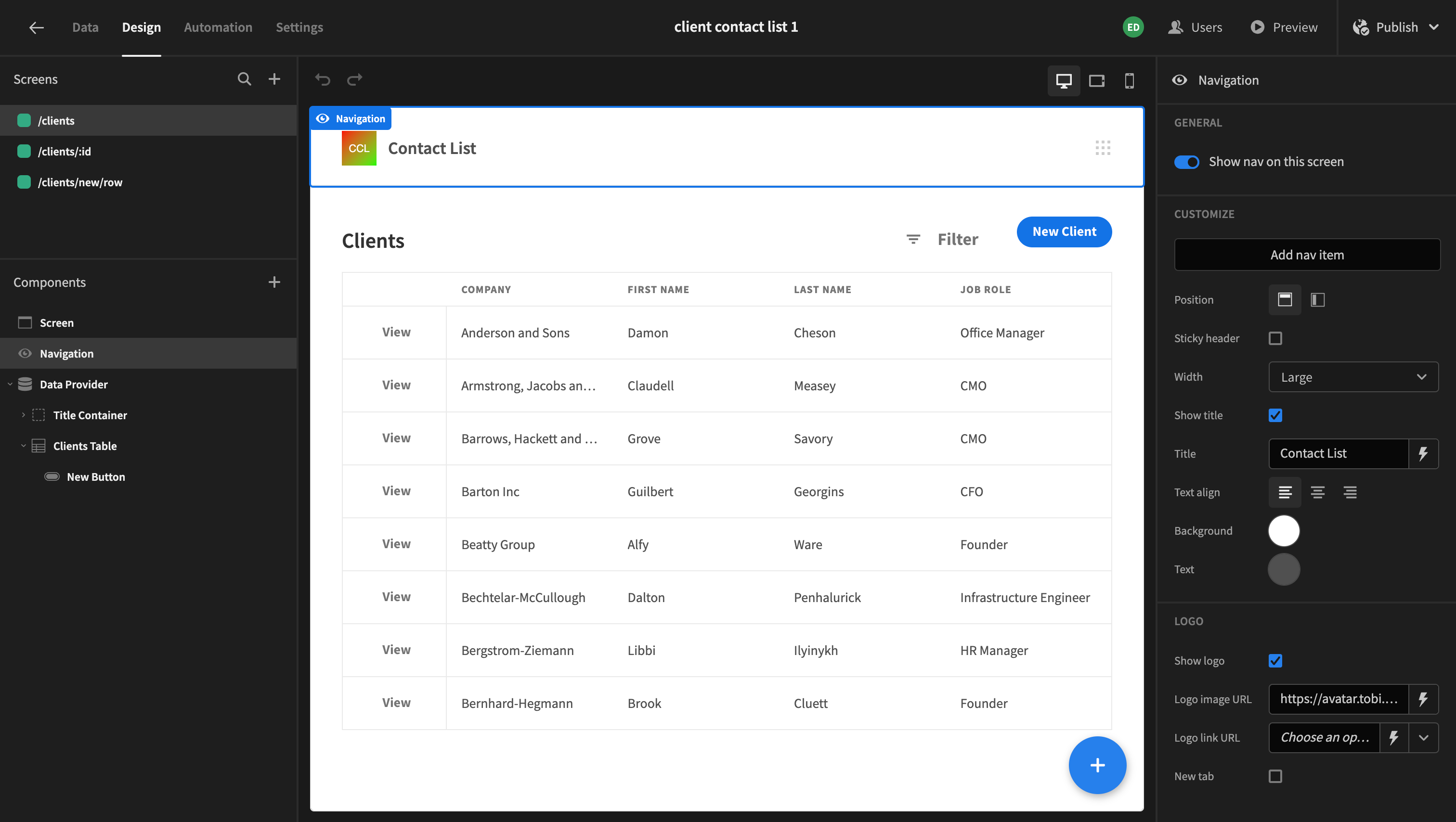
Contact List:
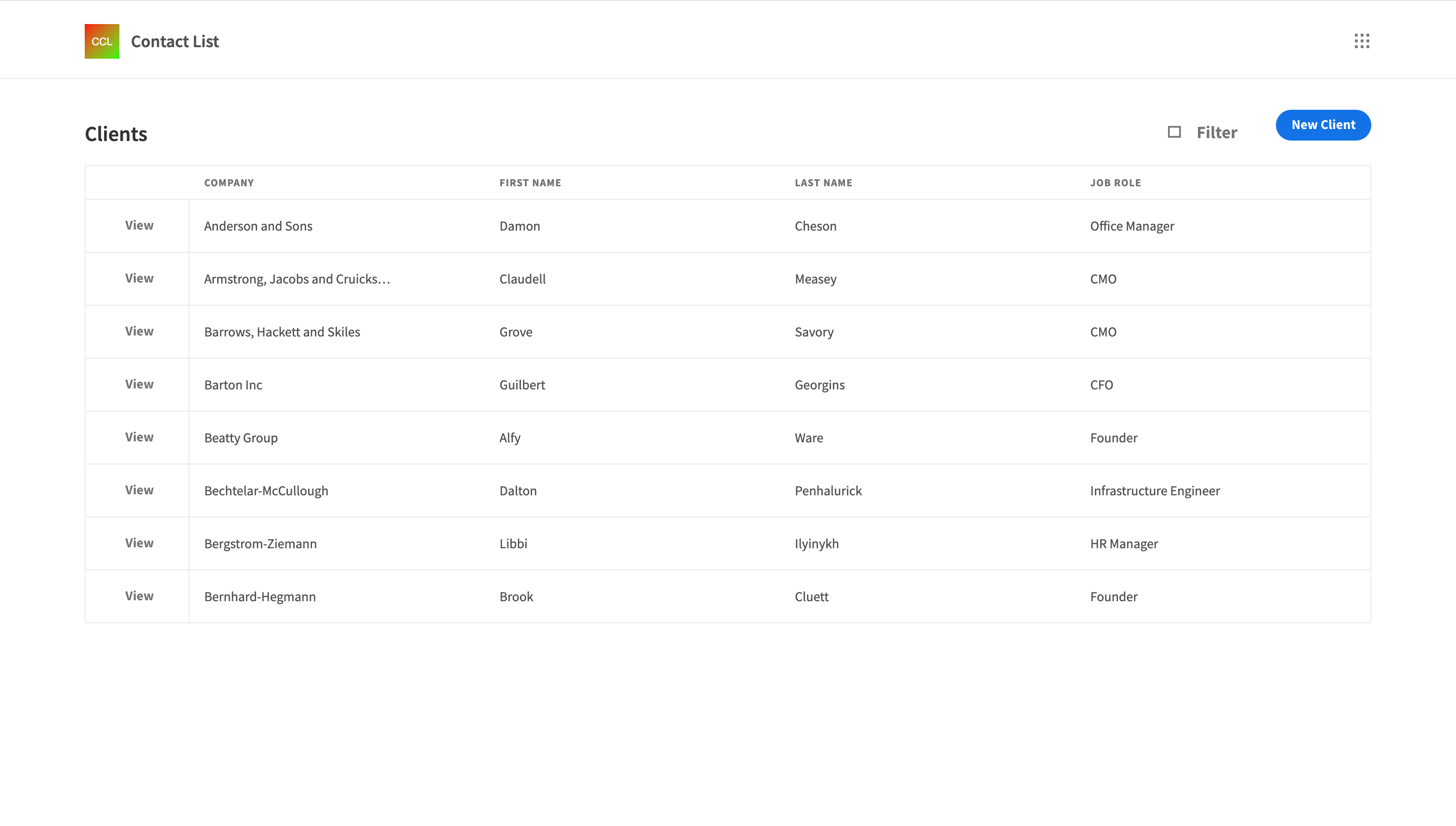
Data Detail Display - Pop-up:
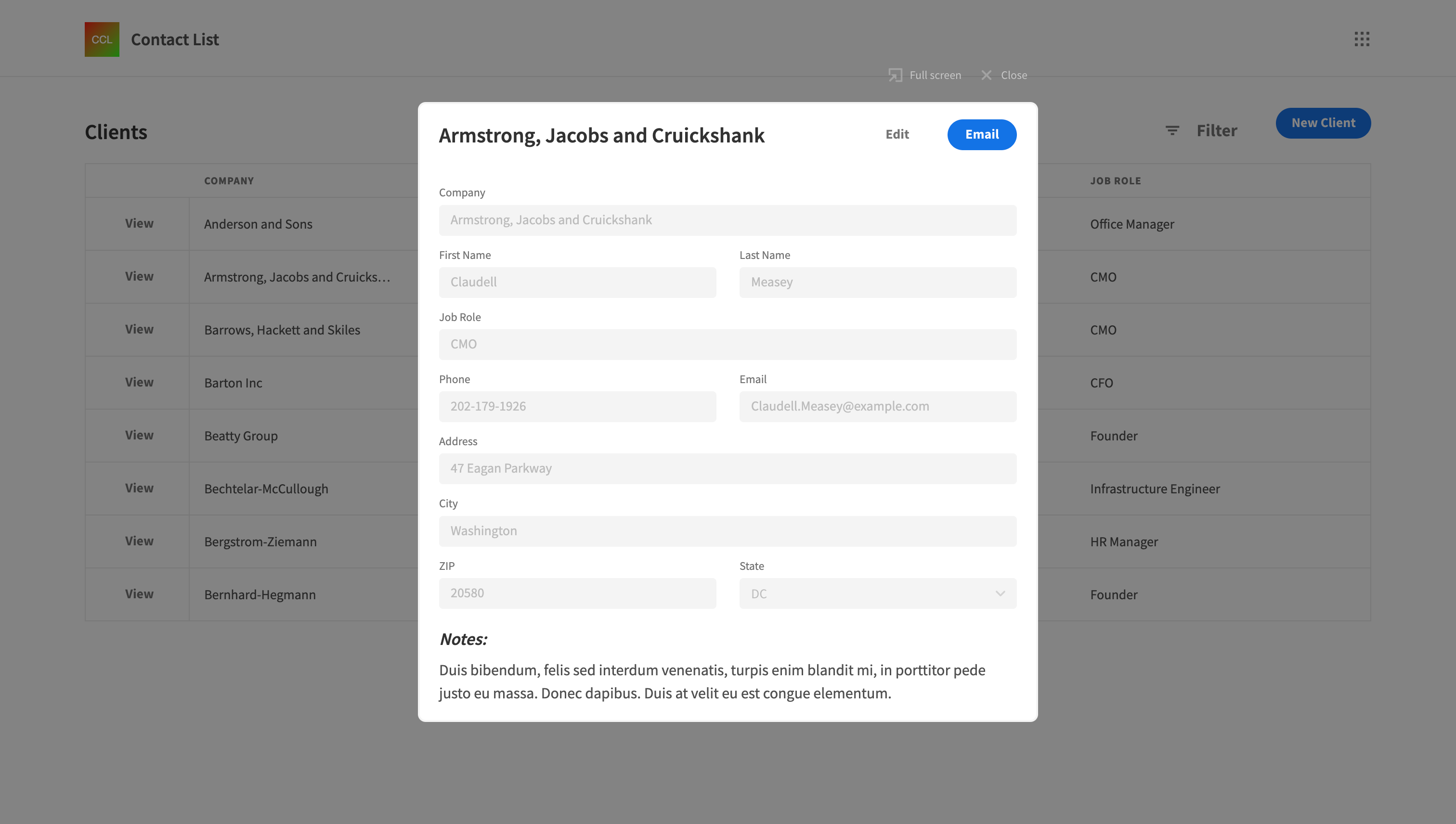
Strengths
- Data Support: Budibase works with many databases and technologies, including PostgreSQL, MySQL, MSSQL, MongoDB, and REST API.
- Many Templates: Budibase offers a wide range of free templates for users.
- Integration and Automation: It provides powerful integration options and automation tools to simplify processes and boost efficiency.
Suitable for
| Internal Tool Type | Is it Suitable? |
|---|---|
| PM | ✅ |
| CRM | ✅ |
| DSM/CSM | ❌ |
| HRMS | ✅ |
| ERP | ✅ |
| BI | ❌ |
How to Get Started
You can use Budibase Cloud directly or run Budibase on your own self-hosted setup.
Tutorial: https://vimeo.com/showcase/budibase-get-started
Pricing
Free Plan: $0
Pro Plan: $600/year for each app creator + $60/year for each app user
Enterprise Plan: Custom pricing based on project needs
Tool 3:Refine
Info
React-based framework
GitHub Project Start Date: 2021
Related Resources:Website | GitHub | Docs
⭐️ Stars: 26.4K
Refine is a React framework designed for building internal tools. It offers many pre-built components and strong data handling features. This helps development teams quickly create admin panels, data dashboards, and custom business systems.
Refine supports various UI frameworks and has flexible permission management. Its architecture is easy to extend. This lets businesses efficiently meet internal needs and create tools that fit their specific processes.With Refine, companies can improve their operations and data visualization. It’s a great choice for IT departments that need to deliver high-quality internal apps fast.
Unlike other low-code/no-code tools, Refine does not provide direct visual editing capabilities. Instead, it primarily serves as a framework for building admin panels, requiring users to write code to create and modify pages.
Content Management Interface:
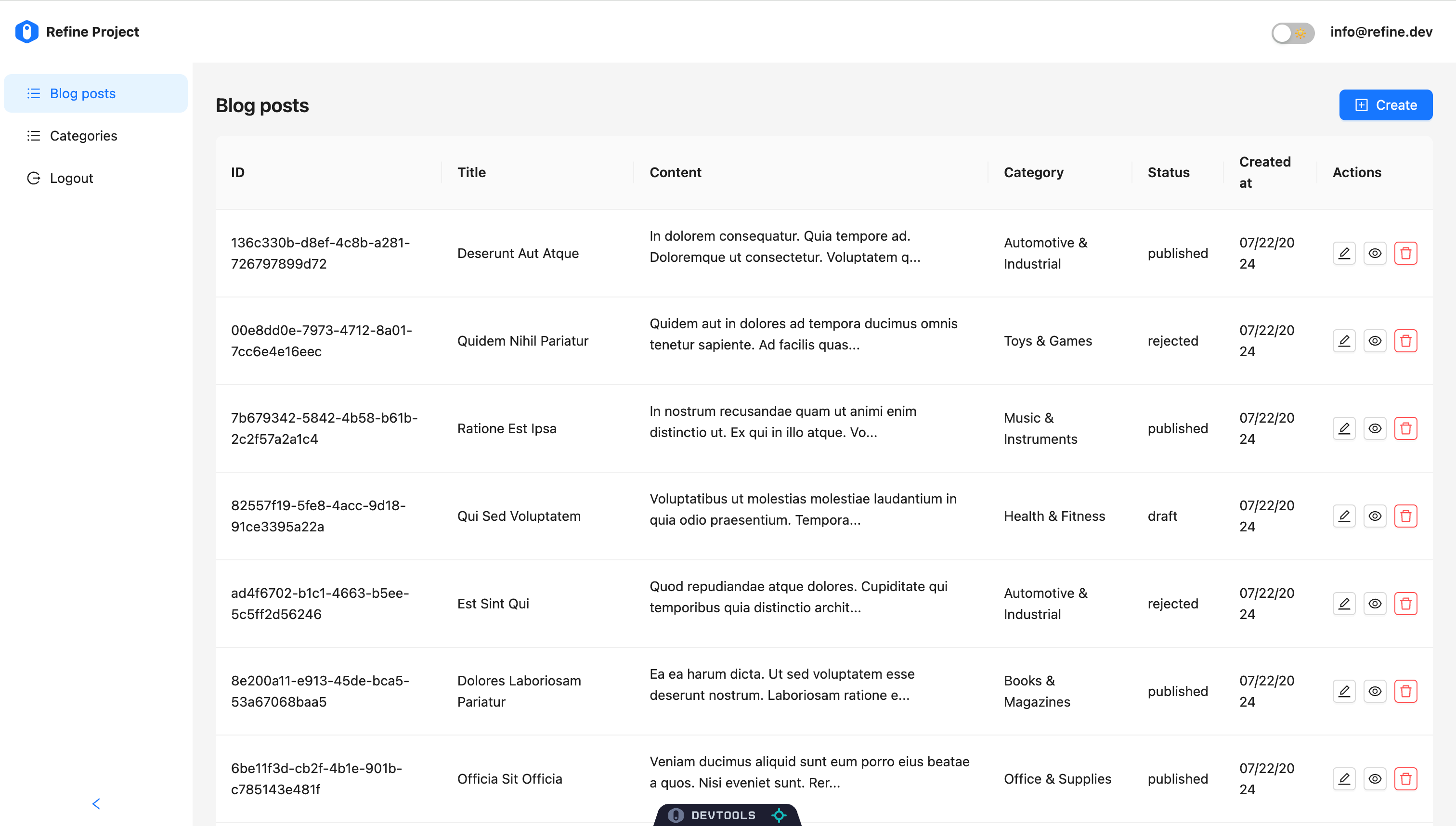
Content Detail Page:
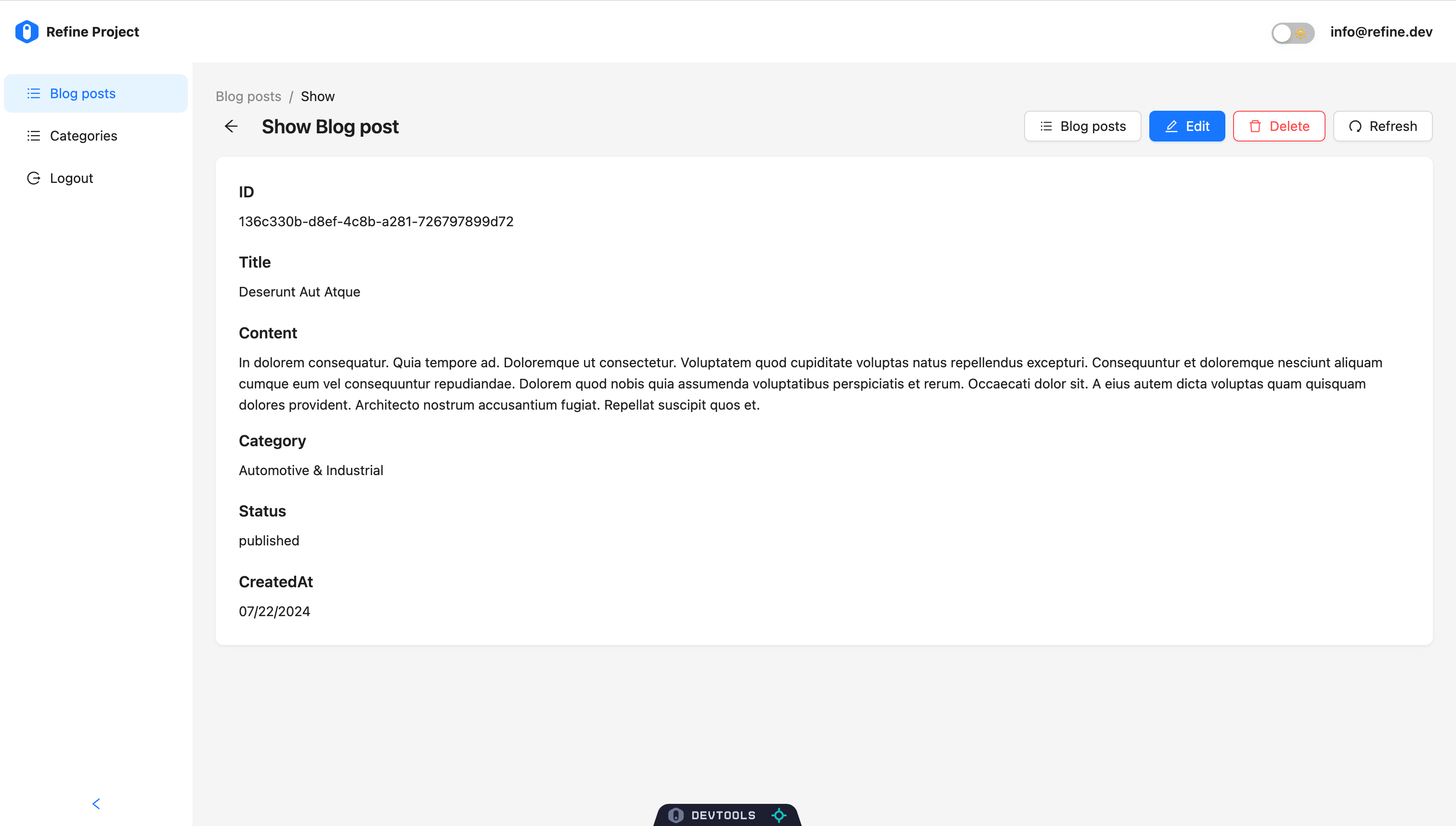
Strengths
- Pure React Code: Refine is a React-based framework designed specifically for CRUD-intensive web applications. It is ideal for building internal tools, admin panels, dashboards, and B2B applications.
- High Customization: With a headless architecture, Refine allows for extensive customization of applications. It decouples business logic from the user interface and routing, enabling seamless integration with various custom designs or UI frameworks.
- Flexible Data Support: Refine supports multiple data sources and authentication mechanisms, making it adaptable to complex enterprise environments and requirements.
Suitable for
| Internal Tool Type | Is it Suitable? |
|---|---|
| PM | ✅ |
| CRM | ✅ |
| DSM/CSM | ✅ |
| HRMS | ✅ |
| ERP | ✅ |
| BI | ✅ |
How to Get Started
Refine can run in any environment that supports React.
Tutorials: https://refine.dev/docs/getting-started/quickstart/
Pricing
Community Version: $0
Enterprise Version: Priced based on specific project
💡 Read More: Open Source CRUD Development Tools: NocoBase vs Refine
Tool 4: ToolJet
Info
Low-code
GitHub Project Start Date: 2021
Related Resources:Website | GitHub | Docs
⭐️ Stars: 28.3K
ToolJet is an open-source low-code platform designed for quickly building and launching internal tools. With its easy-to-use drag-and-drop interface, ToolJet lets non-tech users easily create complex, responsive front-end apps, greatly simplifying the development process and time.
A key strength of ToolJet is its teamwork feature. It supports multiple users editing and building apps online at the same time, which is great for team collaboration and project management. Also, ToolJet offers both self-hosted and cloud service options, meeting different business needs for data security and app deployment. Companies can also use ToolJet to run custom JavaScript and Python scripts, adding complex business logic and data processing features to their apps.
ToolJet Setup Page:
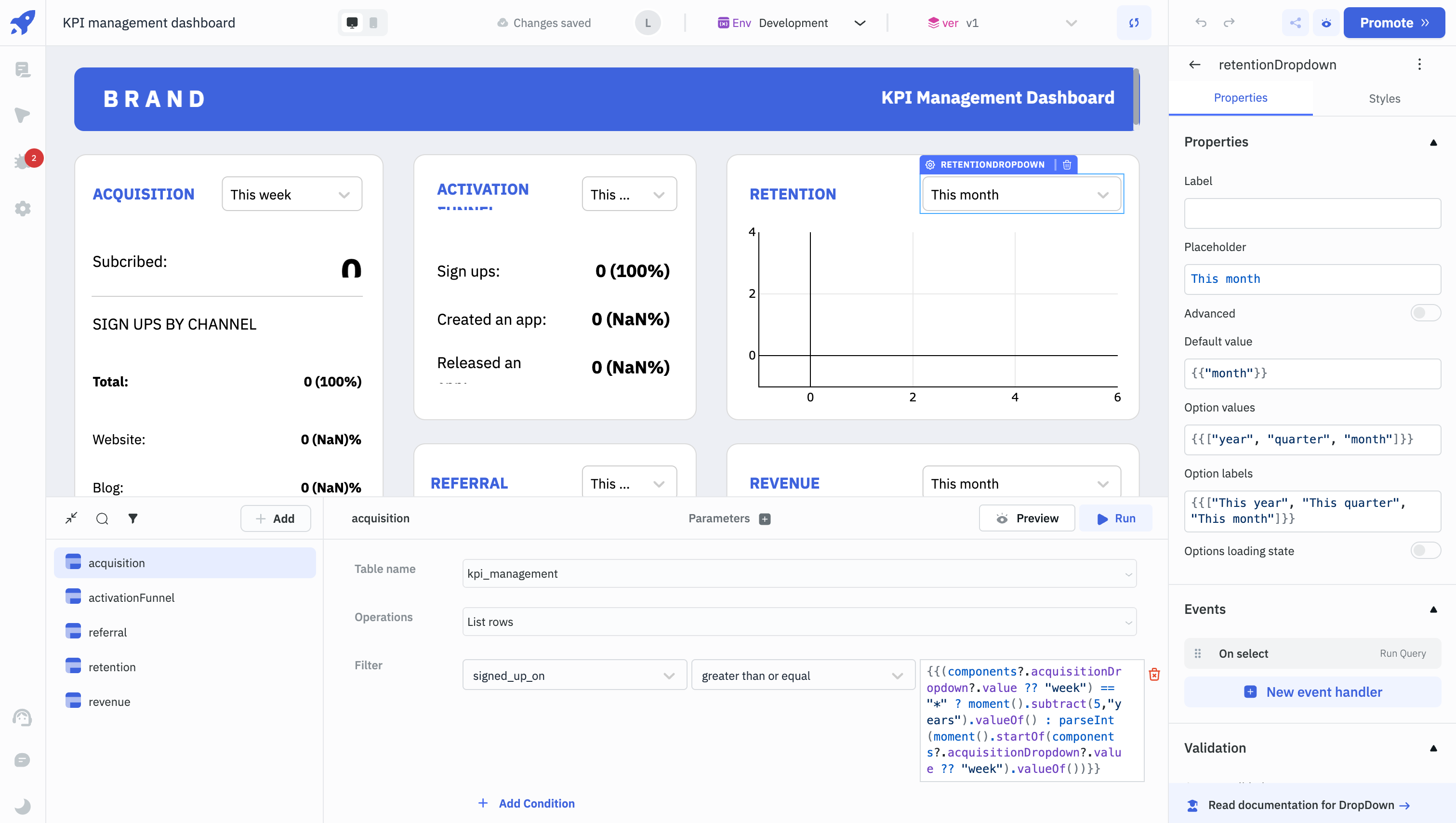
Contact List Page:
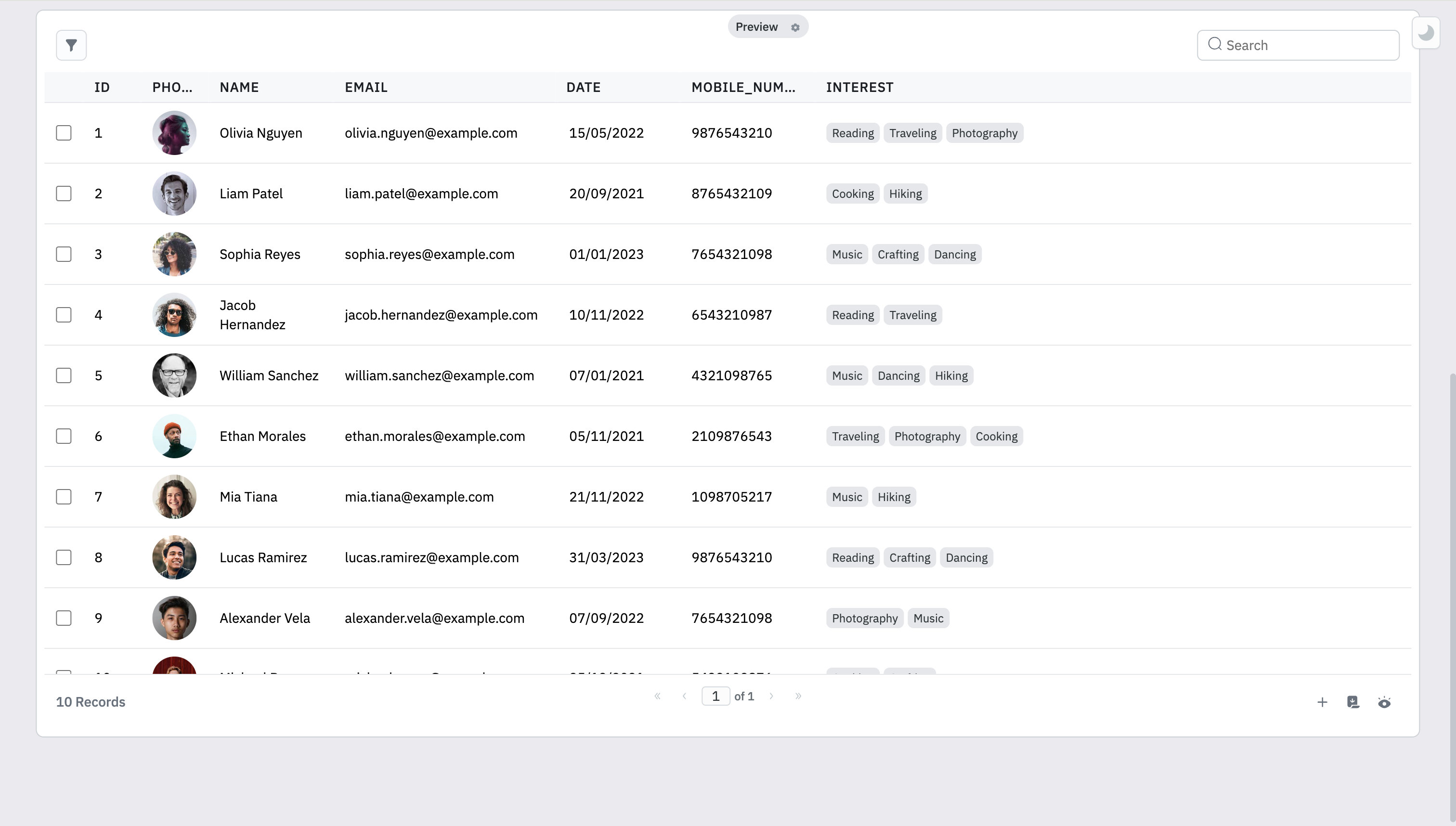
Data Source Connection:
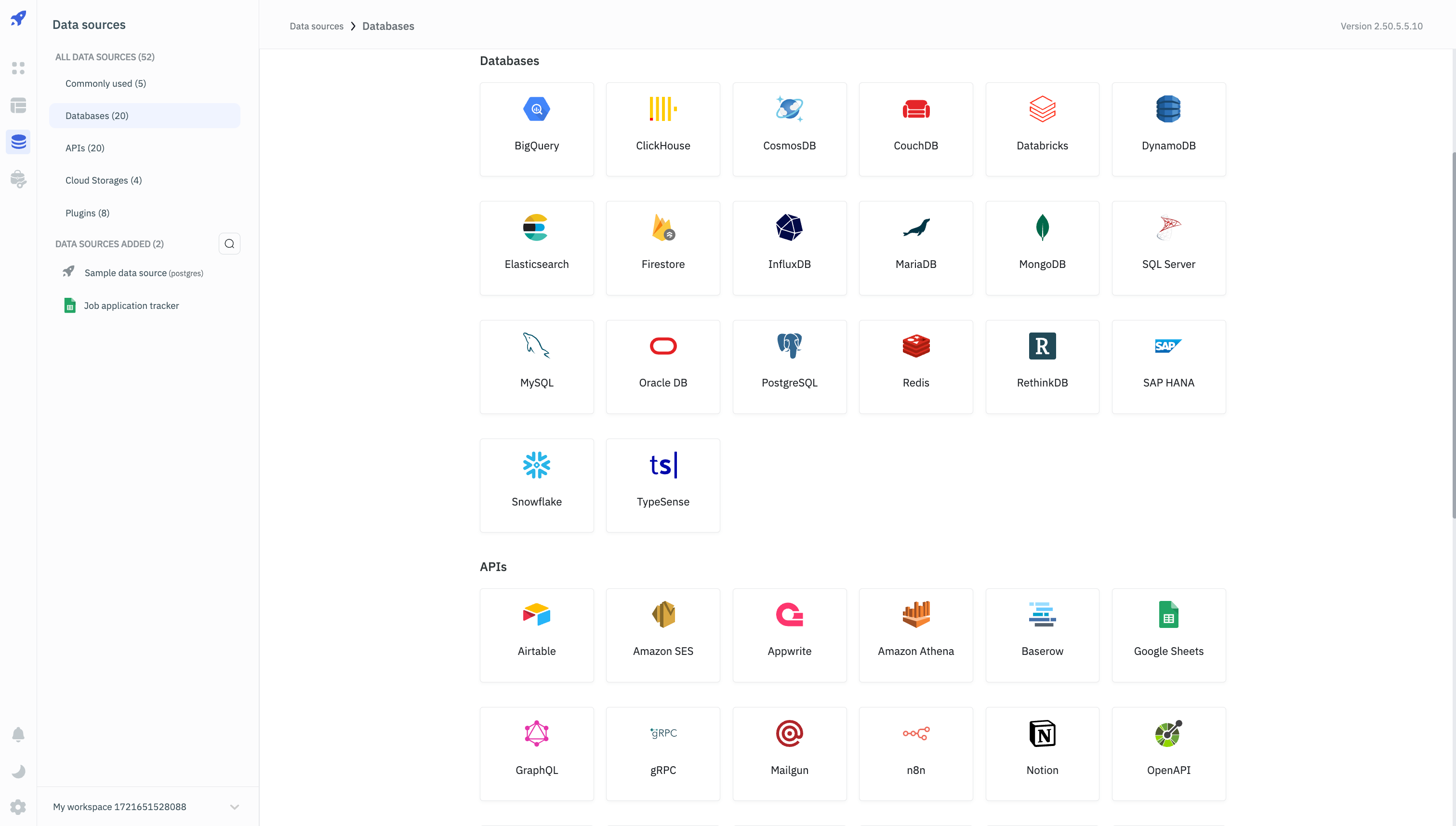
Strengths
- Many data source connections: Works with various databases (like PostgreSQL, MongoDB), API endpoints, SaaS tools (like Stripe, Slack), and object storage services.
- Multi-user teamwork editing: Supports multiple users editing apps online at the same time, boosting team productivity.
- Self-hosted and cloud options: Offers self-hosted choices and cloud service solutions to meet different company deployment needs.
- Code running: Can run custom JavaScript and Python code snippets in apps, adding flexibility.
Suitable for
| Internal Tool Type | Is it Suitable? |
|---|---|
| PM | ✅ |
| CRM | ✅ |
| DSM/CSM | ✅ |
| HRMS | ✅ |
| ERP | ✅ |
| BI | ✅ |
How to Get Started
You can use ToolJet Cloud directly or run ToolJet on your own self-hosted setup.
Tutorial: https://docs.tooljet.com/docs/setup/
Pricing
Basic Version: $0
Business Version: $312/year per app creator + $96/year per app user
Enterprise Version: Priced based on specific project
Tool 5 Appsimth
Info
Low-code
GitHub Project Start Date: 2020
Related Resources: Website | GitHub | Docs
⭐️ Stars:32.5K
Appsmith and ToolJet are very similar in many ways. They’re both open-source low-code platforms for building internal tools and management dashboards. Both tools offer drag-and-drop interfaces, support page code development, work with many databases and APIs, and can be used as cloud services or self-hosted.
Beyond this, Appsmith highlights its “instant deploy” feature. This means users can see and test changes right away while building apps, greatly speeding up development and improving the experience. Also, Appsmith offers a highly customizable interface, letting users enhance app functionality with JavaScript to meet more complex business logic needs. Its rich component library includes not just basic tables and forms, but also charts, lists, and many other advanced components, supporting complex data visualization and handling.
Appsmith Setup Page:
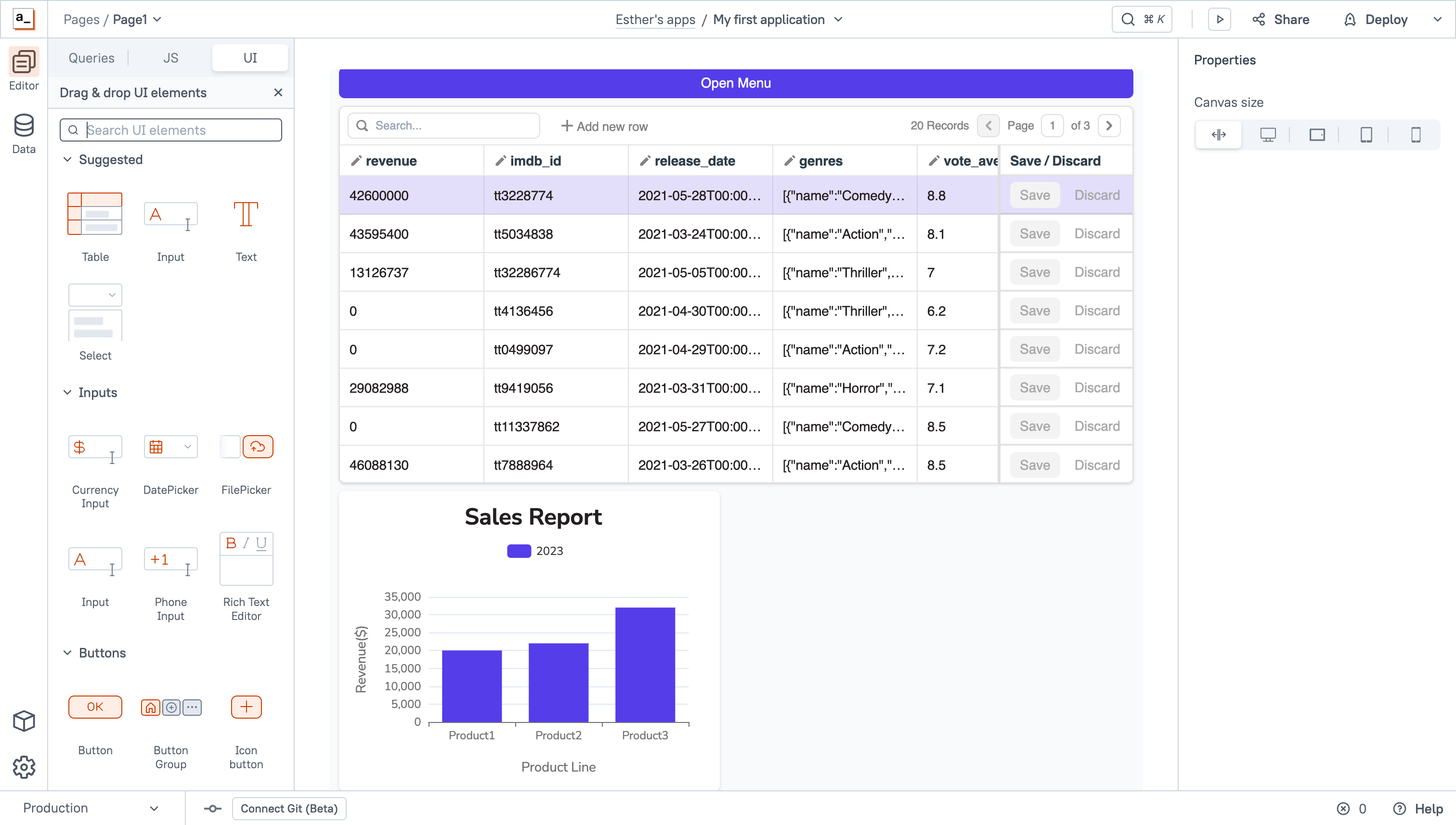
Data Source Connection:
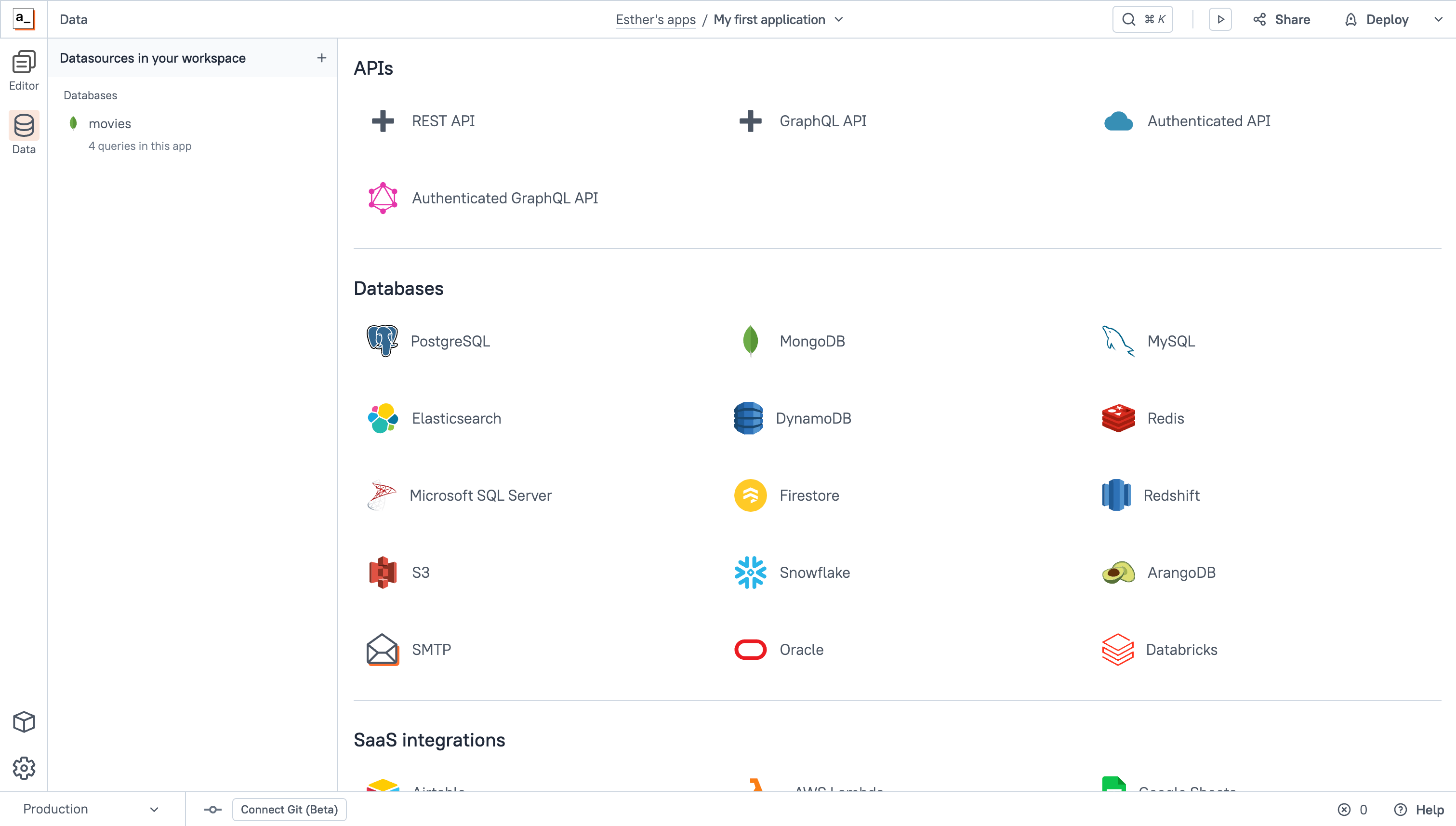
User’s Perspective:
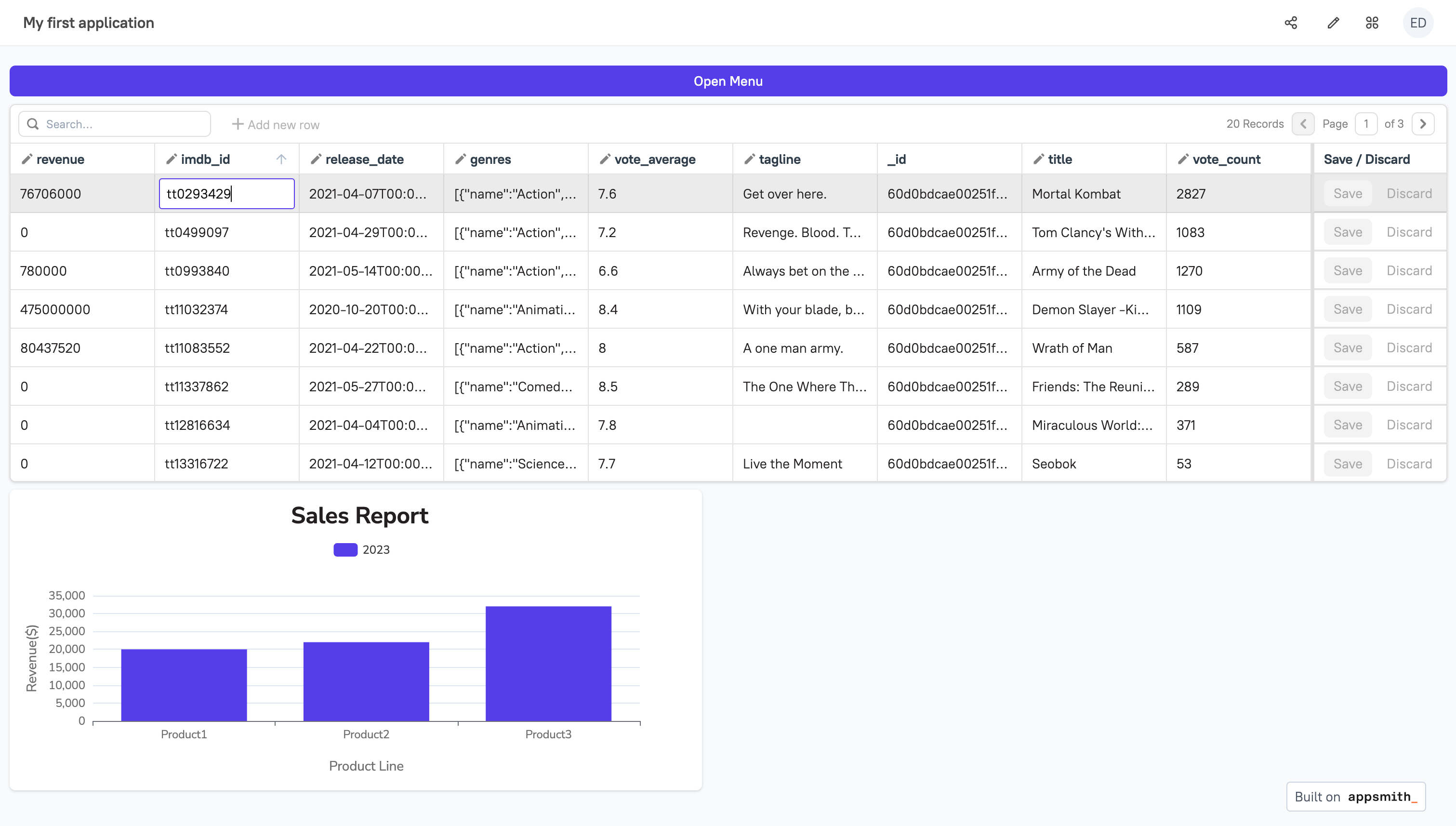
Strengths
- Many integration options: Appsmith works with over 25 databases and any API. This lets developers connect and use various data sources, including PostgreSQL, MongoDB, Elasticsearch, and more.
- Drag-and-drop interface: Appsmith has an easy-to-use drag-and-drop interface. This lets non-tech users easily create and set up management panels and dashboards, making app development and management much simpler.
- Flexible deployment options: Appsmith supports many ways to deploy, including on cloud platforms or self-hosting using Docker and Kubernetes. This meets different companies’ security and scalability needs.
Suitable for
| Internal Tool Type | Is it Suitable? |
|---|---|
| PM | ✅ |
| CRM | ✅ |
| DSM/CSM | ✅ |
| HRMS | ✅ |
| ERP | ✅ |
| BI | ✅ |
How to Get Started
You can use Appsmith Cloud directly or run Appsmith on your own self-hosted setup.
Tutorial: https://docs.appsmith.com/getting-started/setup
Pricing
Free Version: $0
Business Version: $480/year (includes 50 days of use)
Enterprise Version: Priced based on specific project
💡 Read More: NocoBase vs. Appsmith: Which Open Source Low-Code Platform is Right for You?
Related reading:
- Top 11 Open Source Internal Tools with the Most GitHub Stars
- Top 8 Open-Source CRUD Projects with the Most GitHub Stars
- Top 5 Success Cases of Low-Code Open-Source Platforms
- The Top 12 Open-Source No-Code Tools with the Most GitHub Stars
- Discover Top Tools: Accelerate Web Application Development
- Exploring RAD: 5 Best Application Cases